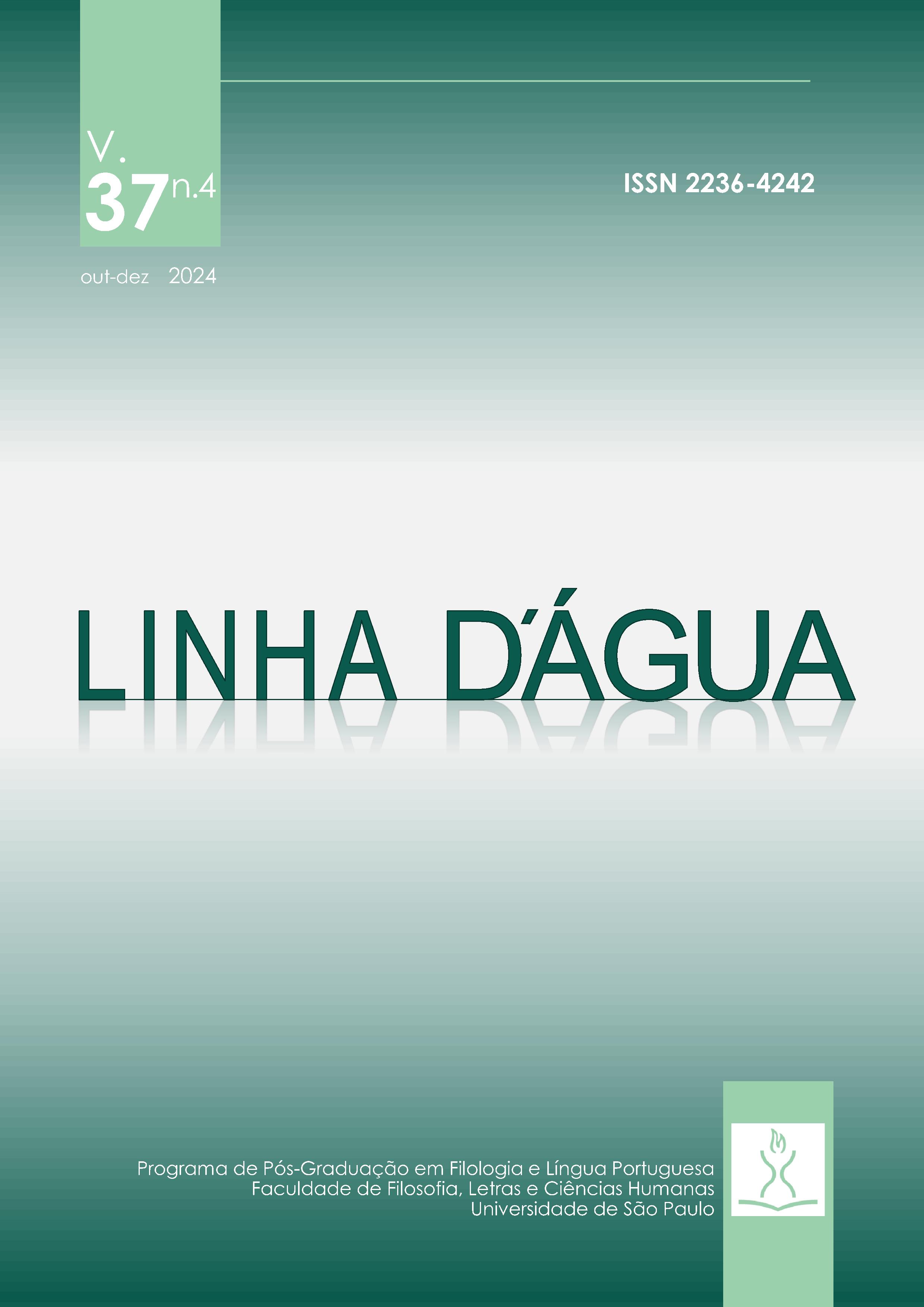Religion and power relations: a discursive analysis of the text “Manifesto à Nação”, from the Brazilian Catholic Apostolic Church
DOI:
https://doi.org/10.11606/issn.2236-4242.v37i4p173-192Keywords:
Discourse Analysis, Manifesto to the Nation, Brazilian Catholic Apostolic Church, Power relationsAbstract
This article analyzes the text entitled, Manifesto to the Nation, written by Dom Carlos Duarte Costa, founder of the Brazilian Catholic Apostolic Church (ICAB). It is a historical document that, in its textuality, materializes relations of force in dispute for positions of power in the religious sphere. Our theoretical framework is Discourse Analysis, founded by Michel Pêcheux (1988;1997;1999 with contributions from Eni Orlandi (1987; 1996a; 1996b; 2001;2002; 2006; 2007). From the analyses we understand the functioning of the power relations between its interlocutors: the ICAB, the Brazilian nation, the pope and the Roman Church. We consider that in the materiality of this Manifesto the places of those who speak and those who listen and where they speak and where they listen are decisive in the confrontations of meanings present in its textuality. The power relationsin the Manifesto, are marked, above all, by Dom Carlos' attempt to create meaning and establish another subject position, through the voice of the new institution, the Church. Finally, we saw that the movement of meanings takes place in the game of control/confrontation, enabling the installation of another site of significance within the scope of Brazilian religiosity.
Downloads
References
ALVES, F. Cisma na Igreja Católica: O bispo de Maura e a fundação da Igreja Brasileira. Campina Grande: Editora Bagagem, 2021.
ALTHUSSER, L. Aparelhos ideológicos de Estado. Rio de Janeiro: Edições Graal, 1985.
BRAY, G. Teologia Medieval. In: BARRETT, M. Teologia da Reforma. Rio de Janeiro: Thomas Nelson Brasil, 2017.
CORREIA, T. Os efeitos de sentido do nome pontifício no discurso do papa Francisco: Uma análise discursiva. 2018. 50f. Trabalho de conclusão de curso. (Graduação em Letras). Universidade Federal de Alagoas. Maceió, 2018.
FLORÊNCIO, A. et al. Análise do discurso: fundamentos & práticas. Maceió: Edufal, 2009.
FREITAS, G. Abençoada Rebeldia. São Paulo: Centro de Estudos Teológicos – ICAB, 1987.
MARX, K. Crítica da filosofia do direito de Hegel. São Paulo: Boitempo, 2010.
MÉNDEZ, L. Igrejas Católicas Nacionais: Origem e normas. Brasília: Editora Ser, 2005.
MOREIRA, C. Produção, circulação e funcionamento da censura na ditadura militar brasileira e no fascismo italiano: a censura na ordem do discurso. 2009. 187 f. Tese (Doutorado em Estudos da Linguagem). Universidade Federal Fluminense. Niterói: 2009.
OLIVEIRA, F. "Por Cristo e pela Pátria”: aspectos político-religiosos na instauração da Igreja Católica Apostólica Brasileira em Alagoas (1970 a 1973). 2023. 115f. Dissertação (Mestrado em História). Universidade Federal de Ouro Preto. Mariana: 2023.
ORLANDI, E. (org.). Palavra, fé, poder. Campinas-SP: Pontes, 1987.
ORLANDI, E. A linguagem e seu funcionamento: as formas do discurso. Campinas-SP: Pontes, 1996a.
ORLANDI, E. O discurso religioso. In: ORLANDI, E. A linguagem e seu funcionamento: as formas do discurso. Campinas-SP: Pontes, 1996b.
ORLANDI, E. Discurso e texto: formulação e circulação dos sentidos. Campinas-SP: Pontes, 2001.
ORLANDI, E. As formas do silêncio: no movimento dos sentidos. Campinas-SP: Editora da Unicamp, 2002.
ORLANDI, E. Análise de discurso. In: ORLANDI, E.; RODRIGUES, S. L. (orgs.). Introdução às ciências da linguagem: discurso e textualidade. Campinas-SP: Pontes Editores, 2006.
ORLANDI, E. Análise de discurso: princípios e procedimentos. Campinas-SP: Pontes, 2007.
PÊCHEUX, M. Semântica e Discurso: uma crítica à afirmação do óbvio. Campinas: Editora da Unicamp, 1988.
PÊCHEUX, M. Análise automática do discurso. In: GADET, F.; HAK, T. Por uma análise automática do discurso: uma introdução à obra de Michel Pêcheux. Campinas-SP: Editora da Unicamp, 1997.
PÊCHEUX, M. Papel da memória. In: ACHARD, P. Papel da memória. Campinas-SP: Pontes, 1999.
SILVA, Wagner. Um outro catolicismo: O Bispo de Maura e a Igreja Católica Apostólica Brasileira. Revista Bilros, Fortaleza, v. 5, n. 8, p. 106-125, jan.-abr.2017.
SILVA SOBRINHO, H. F. da. O caráter material do sentido e as classes sociais: uma questão para a Análise do Discurso. Polifonia, [S. l.], v. 26, n. 43, p. 130-150, 2019. Disponível em: https://periodicoscientificos.ufmt.br/ojs/index.php/polifonia/article/view/8307. Acesso em: 29 mai. 2024.
SOUZA, F. A Reforma no Brasil. São Paulo: Editora Souza Lima Ltda., 1974.
Downloads
Published
Issue
Section
License
Copyright (c) 2024 Tibério Teylon dos Santos Correia, Helson Flávio Silva Sobrinho

This work is licensed under a Creative Commons Attribution-NonCommercial 4.0 International License.
The Editorial Board authorizes free access to and distribution of published contentes, provided that the source is cited, that is, granding credit to the authors and Linha D'Água and preserving the full text. The author is allowed to place the final version (postprint / editor’s PDF) in an institutional/thematic repositor or personal page (site, blog), immediately after publication, provided that it is available for open access and comes without any embargo period. Full reference should be made to the first publication in Linha D'Água. Access to the paper should at least be aligned with the access the journal offers.
As a legal entity, the University of São Paulo at Ribeirão Preto School of Philosophy, Sciences and Languages owns and holds the copyright deriving from the publication. To use the papers, Paidéia adopts the Creative Commons Licence, CC BY-NC non-commercial attribution. This licence permits access, download, print, share, reuse and distribution of papers, provided that this is for non-commercial use and that the source is cited, giving due authorship credit to Linha D'Água. In these cases, neither authors nor editors need any permission.
Partial reproduction of other publications
Citations of more than 500 words, reproductions of one or more figures, tables or other illustrions should be accompanied by written permission from the copyright owner of the original work with a view to reproduction in Linha D'Água. This permission has to be addressed to the author of the submitted manuscript. Secondarily obtained rights will not be transferred under any circumstance.










